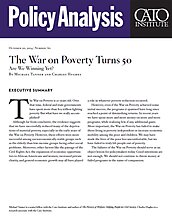Although far from conclusive, the evidence suggests that we have successfully reduced many of the deprivations of material poverty, especially in the early years of the War on Poverty. However, these efforts were more successful among socioeconomically stable groups such as the elderly than low‐income groups facing other social problems. Moreover, other factors like the passage of the Civil Rights Act, the expansion of economic opportunities to African Americans and women, increased private charity, and general economic growth may all have played a role in whatever poverty reduction occurred.
However, even if the War on Poverty achieved some initial success, the programs it spawned have long since reached a point of diminishing returns. In recent years we have spent more and more money on more and more programs, while realizing few, if any, additional gains. More important, the War on Poverty has failed to make those living in poverty independent or increase economic mobility among the poor and children. We may have made the lives of the poor less uncomfortable, but we have failed to truly lift people out of poverty.
The failures of the War on Poverty should serve as an object lesson for policymakers today. Good intentions are not enough. We should not continue to throw money at failed programs in the name of compassion.
Save the Date: On January 29, 2015, Cato is having a special half‐day conference at Columbia University to discuss whether the War on Poverty succeeded in reducing poverty in the United States, what remains to be done, and whether private charitable efforts would be a better alternative to government welfare programs.


